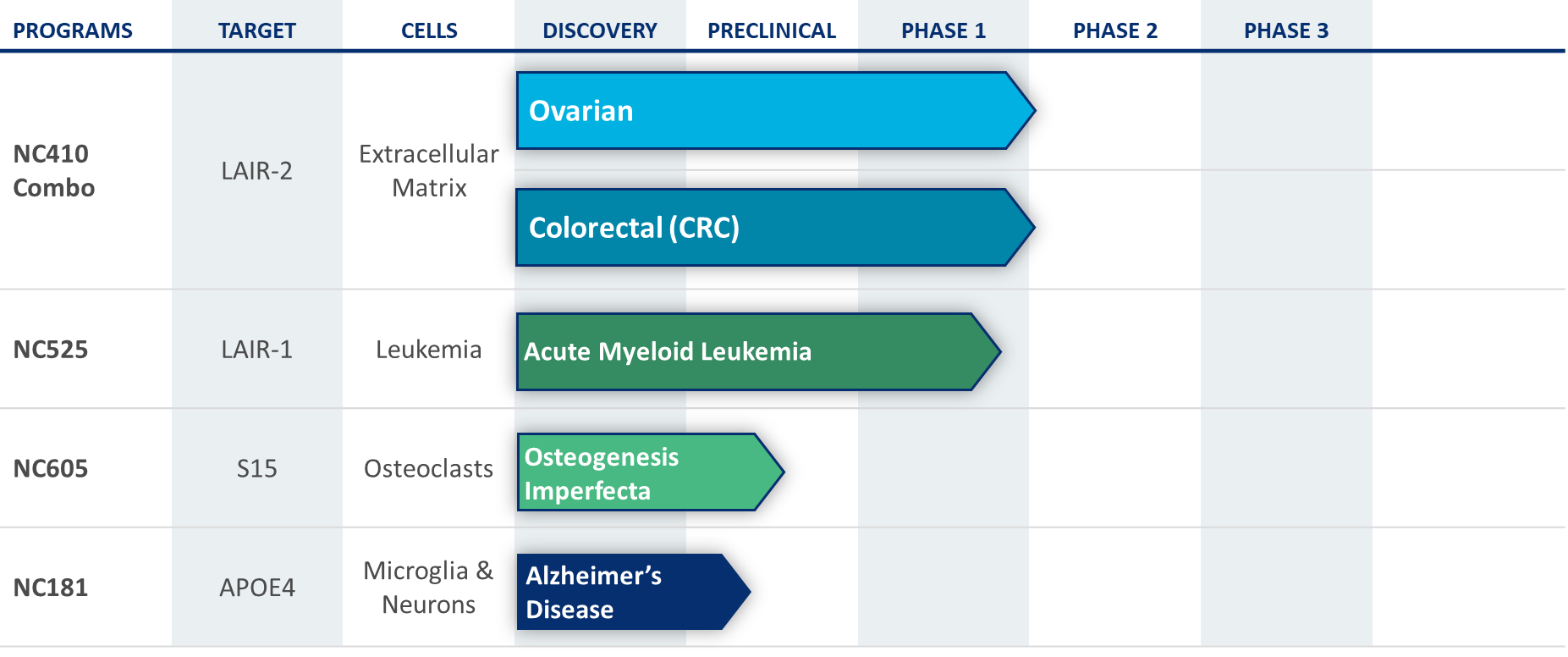
NextCure is pursuing strategic partnering opportunities with pharmaceutical and biotechnology companies and develop biologic-based therapeutics for the treatment of cancer, autoimmune, neurological disorders and expanding to a variety of therapeutic areas.
We are exploring in-licensing opportunities for late-stage Ph1 or Ph2 clinical assets with streamlined development paths.
For more information, please contact [email protected].
Programs Available for Partnering

NC410, is a first-in-class immunomedicine designed to block immune suppression mediated by LAIR-1, an immunomodulatory receptor expressed on a variety of immune cells including T cells and myeloid cells. In non-clinical models and early-stage monotherapy clinical studies, we have demonstrated that NC410 can remodel collagen in the extracellular matrix (ECM), the tissue matrix surrounding the tumor, which enhances T cell infiltration into the tumor. Elevated collagen levels in the ECM are associated with resistance to PD-1 and PD-L1 therapies. Our translational work has shown that NC410 blocks the interaction of LAIR-1 with its binding partners, thereby promoting T cell function and immune cell mediated activity to contribute to restoring anti-tumor activity. Consistent with our strategy, we believe NC410 has the potential to address the needs of patients who are not adequately addressed by currently available therapies. It is currently concluding a Ph1 trial in combination with pembrolizumab for the treatment of patients not eligible or refractory to PD-(L)1 therapeutics. NC410 combo shows evidence of clinical activity in hard-to-treat cancers: (i) 3 partial responses out 7 patients in PD-(L)1 naive ovarian cancer and (ii) 2 partial responses out of 19 patients in MSS/MSI-L colorectal cancer without liver metastasis.
NC525, is a monoclonal antibody and specifically binds to LAIR-1 to induce killing of AML blast cells and leukemic stem cells while sparing normal blood cells, including hematopoietic stem cells. The mechanism was recently described and published in the Journal of Clinical Investigation (Lovewell RR et al., J Clin Invest 2023). Our research further showed that NC525 reduced tumor burden in leukemia models. NC525 is in a Ph1 dose escalation study in AML.
NC605 is a monoclonal antibody and specifically binds to siglec-15 (S15). S15 is expressed on osteoclasts, a cell-type in bone that breaks down old and damaged bone. NC605 has been specifically designed to inhibit osteoclasts and prevent bone loss. In addition, it has the added benefit of promoting bone formation. It is being developed for osteogenesis imperfecta, a rare bone disease where patients suffer from weak and brittle bones, and other bone disorders such as non-union fractures and osteoarthritis.
NC181 is a monoclonal antibody and specifically binds to APOE4. APOE4 is major risk factor for Alzheimer’s disease. NC181 has been designed to reduce amyloid plaques, suppress neuroinflammation and improve blood flow in the brain.
Other novel proprietary targets, identified through our FIND™ (Functional, Integrated, NextCure Discovery) discovery platform, are available for collaboration with companies that have ADC linker/payload technologies.
